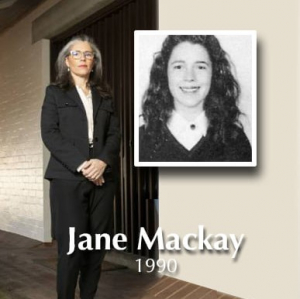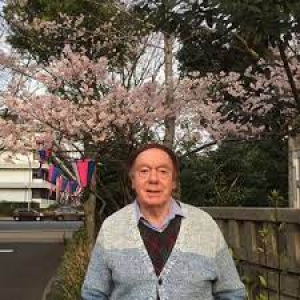Peter MALONE
Annette
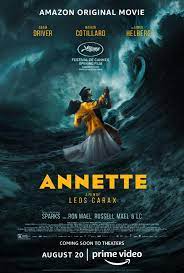
Annette
France, 2021, 141 minutes, Colour.
Adam Driver, Marion Cotillard, Simon Helberg, Devyn McDowell, Ron Mael, Russell Mael.
Directed by Leos Carax.
Some advice points before the review. This is a film for a specialist audience. And, a definite recommendation, that the film should be seen in a dark theatre, on a big screen, with no surrounding distractions. It has been directed by idiosyncratic French director, Leos Carax, and, for those not familiar with his films, it might be helpful to watch one or other before watching Annette (Lovers on the Pond Neuf, Holy Motors). And the screenplay is based on a musical story by the renowned Ron Mael and Russell Mael, The Sparks Brothers (recently portrayed in Edgar Wright’s documentary, The Sparks Brothers). Over the decades they have produced many videos of their music.
Perhaps Annette can be called a musical. Or, perhaps, a drama with many songs. The narrative is not entirely unfamiliar, a successful performance artist, a successful opera singer, their marriage, their daughter, Annette of the title, his reputation sliding, those on the ascent, memories of A Star is Born. However, there are some rather grim variations on that familiar story.
The film opens with the stars singing a film about starting, followed by crowds, exuberantly walking through the city – and most of the central action takes place in Los Angeles. And this sets the tone for the film, the songs expressing the feelings of the central couple, becoming more dramatic as the story progresses, even tragic. One of the characteristics of the songs is that the lyrics are very plain, sometimes mundane, and repeated and repeated. Rather recitatif.
And it stars Adam Driver as a performance artist, called The Ape of God, playing to large crowds in theatres, eccentric behaviour, postures, declaiming to the audience, twirling the microphone… And encouraging response from the audiences who then become part of the singing chorus. And it also stars Marion Cotillard as Ann, a successful opera singer. She drives in a limousine. He dons a helmet and rides a motorbike. And, interspersed, are some satiric TV news sequences, SBS (Show Business Special) commenting on the stars, courtship, marriage, the birth of Annette.
As the artist’s fortunes slide after a very serious performance in Las Vegas, condemned as unfunny, he takes to drink. And the film becomes quite dark and grim.
With the title focusing on Annette, there is a very striking sequence of her birth, nurses and doctor singing a repetitive theme of “Come out…”. And the film uses the device of a puppet playing Annette – who, in fact, has a powerful singing voice, from her mother.
Which means then that the film is highly stylised, enticing audiences who enjoy the challenge of stylising, but may well alienate (rather quickly) those who are not on its wavelength or feel no desire to be on its wavelength. There are themes of performance and the effect on stars, courtship and marriage and sexuality, domestic violence (and Ann having a dream sequence where six women raise Me#Too accusations).
Ultimately, the film focuses on Annette, her singing, the effect on her father, the pass catching up on him, law and prison, said sequence where Annette farewells her father singing and lamenting that he has no one to love.
The film opened the 2021 Cannes Film Festival and one for characters the Best Dir award. There is a tantalising quality about it.
- A specialist film? For a specialist audience?
- The films of Laos characters, idiosyncratic, a focus on female characters, interactions with the male characters? Love, falling out of love, tragedy?
- The film by The Sparks Brothers, their music reputation, compositions, the music, the lyrics, the style, recitative? The creating the story? Echoes of A Star is Born?
- An international film, in English, sections in French, the Los Angeles setting, filming in other countries? The sensibility of the directorr? Of the performers?
- Screen presence of Adam Driver and Marion Cotillard? Their careers? Interpretations here?
- The range of songs, the melodies, the lyrics, revealing situations, characters? Commenting on characters? Their expressing their interior feelings? The contrast between Henry as performer, and as opera singer? Annette and her singing, the buildup to the finale, her silence? Singing in the prison with her father?
- The opening, showbiz, Henry and the accompanist, the singing chorus and their reappearance during Henry’s performances, the crowds gathering, starting?
- Henry, severe looking, tall and angular, black clothes, his motorbike and helmet, his going to the theatre, the streets of Los Angeles and the theatres, the hoarding, The Ape of God? Dressing, shorts and the dressing gown, going on stage, the atmosphere, the adoring crowds, his postures, words, the microphone, performance, Jude situation is, words, the crowd responding? The variety of performances? Success, interjections? Going to Las Vegas, re-enacting the sequence of tickling and’s feet, the hostile response of the crowd?
- And, the limousine, opera, audiences, bowing and Henry’s comment on this? Their falling in love, courtship, the wedding, the sexual encounters, her pregnancy, the sequence of her giving birth, laughing, nurses and the Dr singing?
- Annette, the use of the puppet, the effect on the audience, her look, size, going up, the little girl, and going home, the pool, playing with Annette? Her father’s devotion? His drinking, going on the boat, on deck, drunkenly dancing with And, overboard, her drowning? Henry surviving with Annette?
- The accompanist, with the couple, coming later into the action, accompanying Henry, accompanying Annette? His desire to conduct, success? At the pool, the encounter with Henry, Henry him pushing him under the water, his death?
- Annette, the discovery of her singing talent, the performances, the audiences? Henry deciding about her last performance? In the Los Angeles Bowl? The compere and his enthusiasm? The setup, the crowds, the lights, and it coming with the drones, on top of the tower, is changing colour? Her hesitation? Her hand over her mouth?
- Henry, the arrest, in the court, the judge, the woman with the oath, his not wanting to tell the truth? Behaviour in the court? Going into the room, the prison dress, the guard, bringing Annette, an actress instead of the puppet, their discussions, the singing together? Annette and the song that Henry had no one to love?
- The overall impact of this cinematic, dramatic, musical, specialist experience?
Stories from past students of Daramalan
Stories from past students of Daramalan
Some months ago, we included some of the stories and photos from the Daramalan Alumni Facebook page, with its lively editor and comments. It received a good number of hits. A good idea to add some more – and Daramalan is this year in its 60th year.
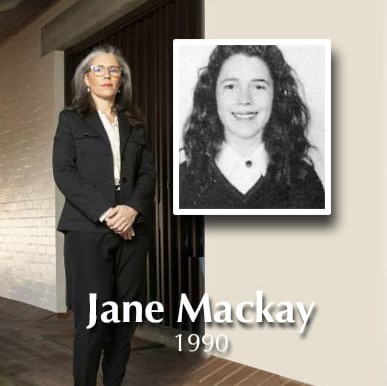
THIS IS JUST A SINGLE STOREY ABOUT AN ARCHITECT
Ex-Daramalan girl Jane Mackay (1990) has just been elected as the Australian Institute of Architects ACT chapter president. Now Jane Cassidy, she is a registered architect with GHDWoodhead, working on large-scale public infrastructure throughout Australia but still enthusiastic about good design in Canberra. Her impressive CV over the last 30 years is a real testament to her commitment and talent, which was no doubt inspired by her father John Mackay the Chairman of ACTEW for many years. Well done Jane.
DARA BOY MAKING HIS MARK AT SOUTH SYDNEY
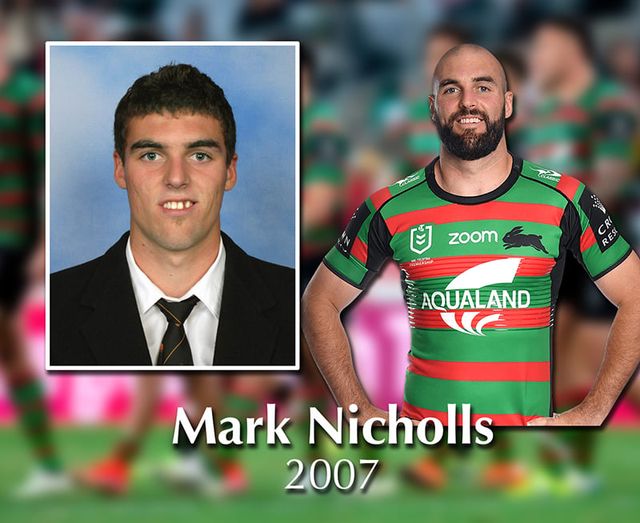
A big congratulations to Mark Nicholls (2007) who yesterday was chosen as captain of the South Sydney Rabbitohs in this weekend’s NRL game against St George Illawarra (Sept 4th). Mark, who was a bit of a sporty kid at school, excelled in Cricket, Swimming, Athletics, Cross Country, AFL and represented the ACT in Rugby League. He was also the College Boys’ 2007 Aquathon Champion. (I’m exhausted just writing this story!)
He started his playing career with the Raiders in 2012, moving to Melbourne Storm in 2017, joining South Sydney in 2018. Scoring three tries this season and playing as Lock Forward, Mark will lead his team in Saturday’s game starting at 7.30pm. Well deserved Mark!
OUR GEORGIA HAS CERTAINLY ACHIEVED HER GOALS
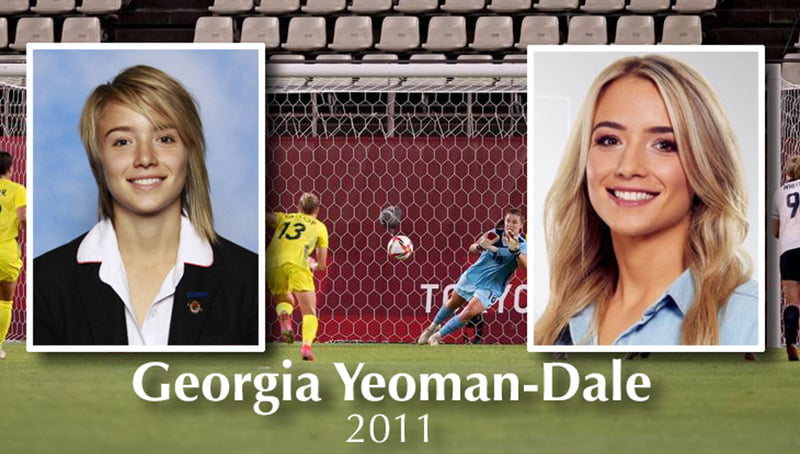
Hopefully you got to watch the Matildas v Great Britain match at the Olympics last night with Australia winning controversially 4-3. I’ll ignore the incident (because we won) but it was all explained and analysed by Channel 7 Tokyo commentator Daramalan’s own Georgia Yeoman-Dale from 2011.
Georgia has played for a variety of clubs over the years including Canberra United, Newcastle and Sydney. She also debuted for Australia in 2012.
MICK'S ADDING A BIT OF COLOUR TO CANBERRA LIFE
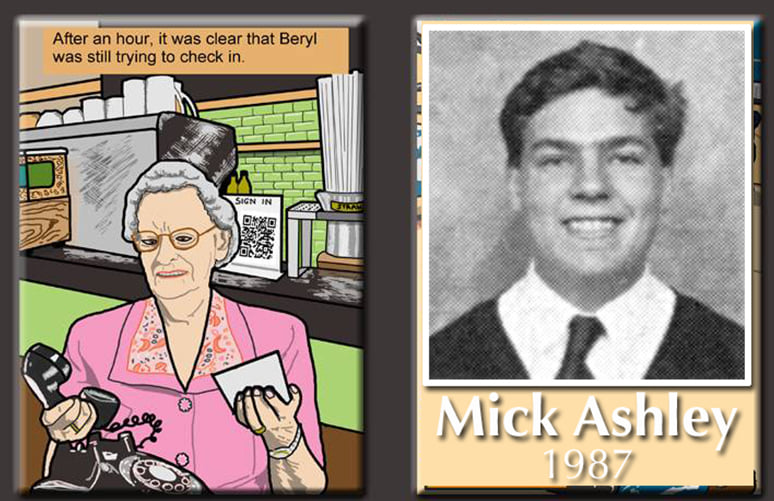
With COVID becoming the new norm, it’s up to an ex-Dara boy to poke a bit of fun at how our lives have changed. Artist Mick Ashley (1987) has just released his 2022 calendar poking fun at the quirky side of the pandemic restrictions in Canberra from checking in with a rotary phone, to pets dressed in costumes by owners with too much time on their hands.
Mick said, "It's hard to get away from COVID-related issues, however it makes my creative life a little easier coming up with ideas and hopefully some cheer”. He finished by saying “a big call out to all the brave creatives out there who have been hurting, please keep going”. If you’d like to support Mick during these tough times, you can order a calendar from his website https://mickashley.com.au/product.../products/calendar/
The editor of the Daramalan alumni site confesses that there was an article about carving and sculpting and a pun for the heading was needed – but none woodwork.
PS. Another former Daramalan student sometimes appears in the news – aspects of sports!
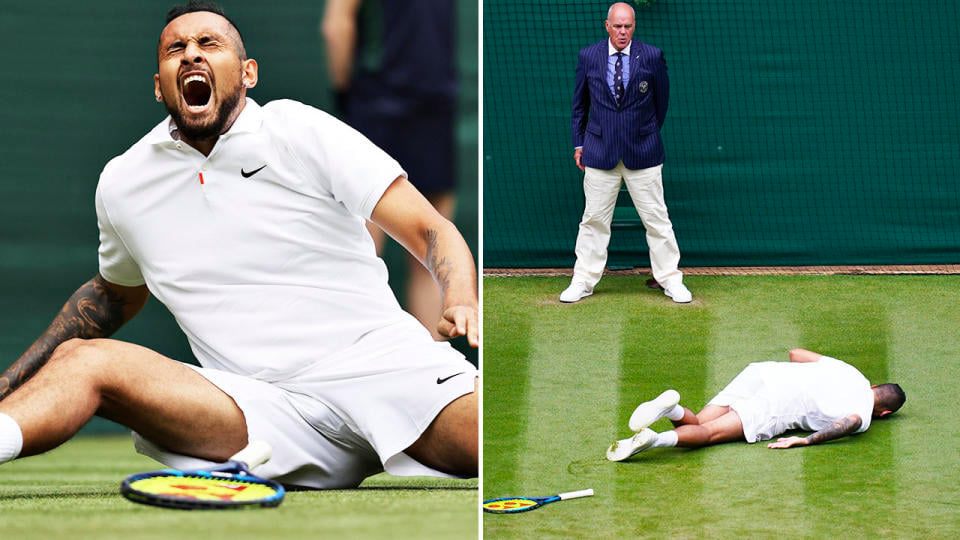
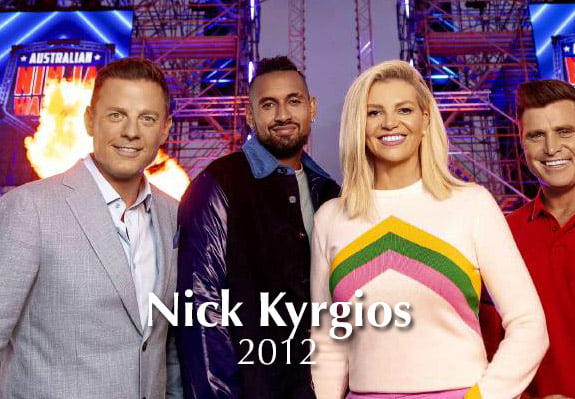
A Monivae PS to the Plenary Council.
A Monivae PS to the Plenary Council.

Today, October 11th, is the 59th anniversary of the opening of Vatican II. 2000 Bishops in copes and mitres, and the Pope carried on the Sedia Gestatoria, walked into St Peter’s and closed the doors. Pope John XXIII urged them to open the windows for renewal and updating, aggiornamento.
The first session of the Australian Plenary Council has opened the discussions after so much preparation. Sixth months of prayer, reflection and activity follow until the second session and decisions. What will the Australian Church look like in 12 months at the 60th anniversary of the opening of Vatican II.
At the closing Mass yesterday, Tim Costelloe asked: “What is it that's stopping us from being the Church that the Lord is calling us to be?”
(Some of us were very taken with Mary Coloe’s observation that it would be good if all Plenary members were able to leave their titles and regalia at the door, and talk with another.)
And the Monivae news!
Monivae College and the Plenary Council: A former student of Monivae has pointed out that they have an excellent representation at the Plenary Council, as follows:
- Past Rector: Fr Malcolm Fyfe MSC (Member) Above
- Past Students:
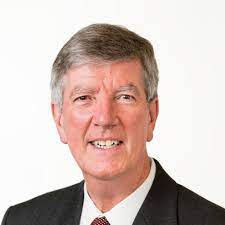
- Fr Brian Boyle (Member)

- Dr Audrey Brown (Facilitator)

- Fr Stephen Hackett MSC (Secretary).
Land
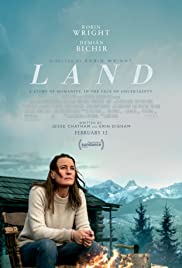
LAND
US, 2021, 90 minutes, Colour.
Robin Wright, Demian Bechir, Kim Dickens, Sarah Dawn Pledge, Warren Christie, Finlay Wijtok Hissong.
Directed by Robin Wright.
It is not good for anybody to be alone, the words from the book of Genesis. This is one of the main messages of this portrait of a middle-aged woman, her retiring from the world, coping in the mountain wildernesses of Wyoming. While the title does emphasise the land, it might have been more appropriate to call the film Solitude. While there is wonderful scenery, the story is nevertheless introspective.
It can be noted that there is beautiful scenery photography – some drone shots over mountains and valleys. However, the film uses the strange device of minimal drone shots compared with a considerable number of photos of the scenery, like stills, like photos for a coffee table travel book, interpolated throughout the action.
The film is something of a labour of love for actress Robin Wright, striking performances and screening presence over the decades, now making her directorial debut. And, she takes on the central role of Edee, a middle-aged woman, seen initially at a counselling session, urged to express her feelings, but lost in her interior anxieties, feeling that she should separate herself from everyone and so going into the Wyoming mountains.
As might be gauged from these comments, this is not a film for audiences who demand action. Initially, out in the mountains, in the primitive hut with its outhouse, the narrative is very quiet, rather introverted, even somewhat claustrophobic.
Robin Wright’s Edee experiences a number of flashbacks, puzzling the audience, someone who seems to be her sister, possibly a husband and child, but no explanations. -Until later.
The winters are particularly severe, the cold, Edee unwell, probably ready to die.
The drama of the film changes halfway through, the sick Edee discovered by a hunter, Miguel, a sympathetic performance from Demian Bechir, not exactly changing Edee’s decisions for solitude but reminding her, as well as us, that we do depend on others. At one point she asks why Miguel has helped her and he replies that she was in his path and therefore he would help. He himself has his own background story which has quite some elements of pathos at the end.
This is the kind of film that puzzles, the central character who can alienate the audience at times, but a film which which grows on its audience, eliciting feelings of compassion.
And, we realise again at the end, it is not good for anybody to be alone, that we are dependent on one another, that we need to surrender to the goodness and kindness of strangers, otherwise we live in solitude, an isolation that can lead to death.
1. The title? The focus on the land? The exteriors? But the film as one of introspection, the interior landscapes, solitary and solitude?
2. The Wyoming scenery, isolation, the hut and the outhouse, the mountains and valleys, the seasons and snow, the animals, the bear, the interiors of the hut? The contrast with the town, the streets and shops, the diner, the hospital? The visit to Miguel’s house? The musical score? The use of the drone photography for some sequences for the scenery, the majority as stills format, insertions of beauty?
3. The commitment of Robin Wright, performance, direction?
4. The focus on the solitude, Edee and the interview with the therapist, her feelings, not wanting to be with people? Inheriting the land in Wyoming? Going to the town, the advice, the hauling her possessions, the hut? No phone, no car? The decision to stay away, throwing the phone away, no news from the outside?
5. Edee, her age, the mystery, the flashbacks, husband and son, play? Memories of her sister, their discussions, grief? Keeping the explanation until the end, her grief, her telling Miguel the story?
6. Solitary, the interiors, unpacking, the outhouse, survival by herself, food, fishing, the river and getting the water? Chopping the wood? The physical demands? Psychological demands? Gradually building up her way of life?
7. The seasons, the hardships of winter, the outhouse and the attack of the bear, going into the house and the chaos? The cold, the wood on the fire, tearing the pages for the fire? Health?
8. The arrival of Miguel, Alala, their treating Edee, the gradual recovery? Her refusal to go to the hospital?
9. Miguel, staying, his background as a hunter, seeing the smoke from the hut, not seeing it, his finding Edee? Her not being able to kill the deer? His taking her hunting, the shooting, the meet? The bond between them? His coming and going?
10. Edee, her recovery, getting strength, the months passing? Yet haunted by her memories?
11. Miguel and his dog, leaving the dog with Edee, the story of the crash and the death of his wife and daughter? His not returning?
12. Edee and her concern, going into the town with the dog, the hospital, meeting a Alala, going to see Miguel, his throat cancer, in bed, the Native Americans around him, their respect, the rituals? His confession that he was a drinker and that he had crashed the car?
13. Edee, her gratitude towards Miguel, trying to pay him, his refusal, saying that he found her in his path and that he had to help?
14. Edee, facing the truth? The possibilities for her future?
Antoinette in the Cervennes
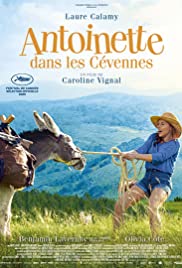
ANTOINETTE IN THE CERVENNES
France, 2020, 96 minutes, Colour.
Laure Calamy, Benjamin Lavernhe, Olivia Cote.
Directed by Caroline Vignal.
One of those brief Gallic celebrations of l’Amour, blending the fluffy, the cute, the romantic.
It comes as something of a surprise to find that it is indebted to the story of Robert Louis Stevenson, his love for the American divorcee, Fanny Osborne, his disappointment in her disappearance to America and his riding a donkey on a trip into the Cervennes.
In fact, the donkey is central to this film, along with Antoinette. And the donkey, has Irish background, is called Patrick. (One has never heard the French pronunciation of Patrick called out so frequently in any other film!).
And, who is Antoinette, played with exuberance by Laure Calamy? She is a primary school teacher, seen changing into an evening dress, leading her class on stage to sing for the parents (a rather eyebrow-raising sexual song for such an occasion). She smiles at one of the parents, and he acknowledges her – and, within minutes, we realise that they are in a sexual relationship. Antoinette is young and passionate. Vladimir is something of a serial womaniser.
And why the Cervennes? Vladimir backs off from a week with Antoinette, telling her that he and his wife and daughter are booked to go on a hiking trip in the mountains. Impulsively, overnight, she books in, turns up at the Lodge, tells her story rather quickly to the gathered guests who seem to take this kind of liaison for granted, are curious, make their comments, and return to their concern throughout the week of hiking.
Quite inexperienced in hiking, Antoinette has booked a donkey – the aforesaid Patrick. He makes quite an impact on Antoinette, of course, pushing, pulling, cajoling, and her eventually falling in love with him. And, we are focused on Patrick, enjoying his obstinacy, enjoying his accompanying Antoinette, always pleased to see him.
Needless to say, there is an encounter between Antoinette and Vladimir – and his wife. Some tense moments, some truth is told, a lot of dismay for Antoinette. And a sprained ankle when Patrick goes racing off, dragging Antoinette behind him.
Which means that Antoinette has both a broken heart and a sprained ankle. Of course, she is young and resilient, and even postpones the train back to Paris when she wants to say farewell to Patrick and finds that he is already tracking with a genial young man. He asks Antoinette to accompany him so that he can get used to Patrick… Of course!
1. A French romantic entertainment? Light?
2. The reference to Robert Louis Stevenson, his story and Fanny Osborne, his travels in the Cervennes, Travels with a Donkey in this event?
3. The city opening, Paris, the school, the performance for the parents? The rendezvous between Antoinette and Vladimir? The transition to the Cervennes, the towns, the countryside, the mountains, accommodation, restaurants? The musical score?
4. Antoinette’s story, changing into the dress in the classroom, leading the children, the performance and the mature adult song? The parents? The relationship with Vladimir? Married? His change of plans? The decision, going to the mountains? Desperation? The booking, meeting the other hikers, the conversation, telling her story, their continued interest and support? The choice of Patrick as a donkey? The comedy with Patrick, pushing, pulling, cajoling? The gradual bond between the two? Her doing the hiking? The encounter with Vladimir and his family? The accommodation at night, the discussions with his wife, going out on the sexual encounter? The comments by the travellers? The walk, the discussions with Vladimir’s wife, her knowing the truth? Patrick racing off, dragging Antoinette, the sprain? The vet tending her? Wanting to go home, the break with Vladimir, going to farewell Patrick, the young man on the hike, her accompanying him? The effect of the journey on her?
5. Vladimir, with his daughter, the performance, the rendezvous, the plans, on the hike, the sexual encounter in the countryside? His wife, her knowing the truth, her confronting Antoinette?
6. The other members of the company, the men, the women, the questions, the gossip, the French and l’Amour?
7. A piece of Gallic fluff?
Voyagers
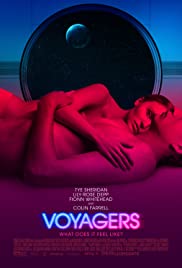
VOYAGERS
US, 2021, 108 minutes, Colour.
Tye Sheridan, Lily- Rose Depp, Fionn Whitehead, Colin Farrell, Archie Madekwe.
Directed by Neil Burger.
Throughout the action of this space adventure, set in 2063, all the characters are adolescents. Which may account for some of the hostile reviews on blogging comments, dissatisfied adult audiences who think that the adolescents should be behaving better. But, this also might indicate how it is the Young Adult story and treatment, appealing to the experiences and aspirations, especially of teenagers, a variation on their world and experiences.
There have been quite a number of journeys into space, characters lost in space, odysseys, as well as science fiction/fantasies of travel beyond familiar galaxies, searches for inhabitable planets, Jennifer Lawrence in Passengers, the scenario for the Young Adult fantasy, Chaos Walking, planets well beyond ours, decades of travel to reach them, the search for possibilities of living beyond a decaying Earth.
This time the voyagers are young children, first seen being created in laboratories, artificial children who will grow up in isolated protection, destined for a mission to a planet where humans can survive, but taking 86 years of travel. The children are to be trained in handling the complexities of space voyaging, travelling by themselves, reproducing, a next-generation, and then grandchildren generation who will inherit this “earth�. They are dressed in black. They live in community. They have their lessons, trained with expertise.
There is an adult, Richard, played by Colin Farrell, who has devoted his life to training, who wants to be allowed to go with the children. He does go on board – and then the action advances 10 years. The children are now adolescents, still with communal living, dressed in black, with high expertise in the management of the spacecraft, the craft programmed with answers for all their problems over the 86 years.
Richard dies.
Those familiar with William Golding’s Lord of the Flies will soon make the connections between this scenario and that of the novel of young boys isolated from adults, on an island, becoming ever more primitive in their behaviour, passions and instincts unleashed, especially violence and dominance.
In the 21st-century, the group on board is of carefully chosen mixed races, boys and girls, a boy who is obviously destined to be leader, Christopher (Tye Sheridan), a girl who is in charge of medical issues (Lily- Rose Depp), and a boy who has been centrally cast, so to speak, to look like the potential rival and villain (Fionn Whitehead).
And so, as we expect, there are jealousies, factions, revelations of violence and, instead of the dead skeleton, the Lord of the Flies, there is the Phantom bogey of an alien in the craft. There is also the element of sexual awakening – but, presented generally, as with some of the violence, more restrained than we might have expected.
Can there be order? Can good conquer evil? What is human nature? And, using religious language, what is the impact of “original sin�?
So, some pessimism about human nature – and, a final optimistic view about the human soul and spirit, and possibilities of life beyond Earth.
1. The title? Voyagers in space? Space exploration, inhabiting space?
2. The 2063 setting, the discovery of a habitable planet, 86 years travel, the children, the next generation, and the grandchildren, the settling of the planet? Plausible scenario?
3. The basis of the film on William Golding’s Lord of the Flies? The adaptation to the 21st century? To space? The focus on the group of children, the absence of adults, human nature (and questions of original sin), adult control, breaking free, the move to anarchy, licensing sex and violence, anarchy? Leadership? Control? Decisions?
4. The introduction to Richard, his discussions with the authorities, the explanation of the plan, the children going by themselves, technically trained and equipped? Richard wanting to go with them?
5. The artificial conception of the children, the numbers, the range? The babies? The growing, the passing of the years? All in black? The education, the training, technical? Separation from others, from the outside world? Confinement to prepare them for the space travel?
6. On the space ship, Richard and his care? With particular children, the focus on Christopher, on Sela, on Zac?
7. 10 years passing? The adolescent children? Physical growth, psychological? The blue liquid and keeping them under control? The importance of the rules? Everything planned, solutions for every situation? Richard and the bonds with the particular children?
8. Richard, his death, the burns, the discussions of an alien? The revelation that Zac had engineered Richard’s death, with the connivance of Kai?
9. The discovery of the drugs within the blue drink? The decision not to take it? The effect?
10. Christopher, personality, sympathetic, leadership, the bond with Sela? His responsibilities? Her responsibilities, medical? The contrast with Zac, assertive, conniving, ambitious, jealous?
11. The activities on the space ship, the attempts to discover the truth about Richard’s death? The discs, the visuals of the truth?
12. Zac, the vote for the leader, the vote for Christopher? Zac and his jealousy? Undermining?
13. The changing behaviour of the adolescents, sexual urges and behaviour, careless and undisciplined behaviour, the dining room, the corridors? The violence, the victimisation of the young man, his being killed? The girl demanding the rules? Her being shot?
14. The division of the children into the two groups, different leadership? Christopher and the few, and their thinking they should join Zac?
15. Zac and Kai as his support? On the fiction of having the alien on board, and possibly inhabiting different children?
16. The issue of weapons, Sela and the knife? The hidden stash of weapons, the and his cohort finding them?
17. The violent confrontation, the weapons, the sack and his shooting? The pursuits throughout the craft? Christopher and Sela, the sexual encounter, hiding, the dining room, Zac and his shooting the doors to the spaces?
18. Christopher and Sela in the spaceport, donning the spacesuits? Zac and his attack, the fights, Christopher out of the pod, Sela and her kicking Zac and his going into space? Christopher and is returned?
19. Order restored, the vote, Sela becoming the leader?
20. The passing of the years, the 86 years, the sighting of the new planet, the elderly, the next generation, the children and hope?
Run/ 2020
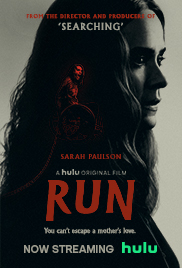
RUN
Canada, 2020, 90 minutes, Colour.
Sarah Paulson, Kiera Allen, Sarah Sohn, Pat Healey.
Directed by Aneesh Chaganty.
Quite an amount of the emotion in this drama. It opens with a mother giving birth, the death of the child after two hours, the mother’s grief.
And then the narrative moves on 17 years, mother and daughter, the daughter severely disabled, unable to walk, confined to her wheelchair, a chairlift in the house for her, her mother ever attentive, and the expected rounds of medication.
The mother is played by the versatile actress, Sarah Paulson. While she shows a lot of sweetness and light as the ever-devoted mother, one wonders whether Sarah Paulson ever plays this kind of sweet role. Of course, she does not, but that is part of the dramatic unfolding of the story. The daughter is played by model and actress, Kiera Allen, introduced in this film. It is a strong role for her, the daughter, Chloe, 17, in many ways confined by her disabilities and wheelchair, but with ambitions to go to college. There are quite a number of home scenes showing the bond between mother and daughter, meal scenes, Chloe and her study in her room, eager for the mail to arrive with the results of her college application.
But, audiences who have seen the trailer or the aids, know that it is going to become something of a horror film. What is the relationship between mother and daughter?
When Chloe becomes wary of some of the tablets her mother is giving her, her mother’s name on the prescription and what tablets contain, she ventures out on some investigations which lead to gradual revelation is, Chloe escaping from the house, perhaps the “run� of the title.
The story becomes more and more tense, the behaviour of the mother more erratic, the daughter on the defensive – and, confined to a basement, where she discovers the back story of her mother, of the birth of her daughter, what is happening. And some flashbacks to the hospital and the birth of the baby.
This kind of tense story, home imprisonment, has been told in various forms before (there are strong parallels between Run and the Octavia Spencer horror story, Ma.) But, with a strong cast and continued tension in the latter part of the film, a satisfying version of this genre.
1. The title? For Diane and her initial running with the baby? For Chloe and the threat from Diane?
2. Canadian production and settings, the city, the hospital and awards, home, the medical equipment for Chloe, the interiors? The town, the streets, shops, cinema, pharmacy? The musical score?
3. The film as a drama, the initial pathos, the concern about the disabled? Turning into a horror film?
4. Diane, the hospital, giving birth, the wheelchair, going to view her baby, the dead baby? The transition to 17 years later?
5. The relationship between Diane and Chloe, at home, the bond, love, mother-daughter, meals, physical care? Diane as the absolutely devoted mother, giving her life for her daughter? Her presence at the Mothercare discussion, the strange reaction, that Chloe would have all the opportunities that she did not?
6. Chloe, 17, study, personality, ambitions to go to college, the applications, eagerly waiting the mail? With her mother, the meals, the discussions, her room, studying abilities, the chairlift, the medication?
7. The seemingly ideal situation? Chloe and her snooping? The discovery of the tablets with Diane’s name? Her suspicions, wanting to investigate, the Wi-Fi? going off, Diane watering the garden, Chloe and the phone calls, the different reactions, her frustrations? Suggesting that they go to the cinema? Her leaving, going to the pharmacy, the long queue, the pharmacist, the discussions, the pills for numbing animals? Diane arriving, the confrontation in the pharmacy?
8. Chloe in her room, the door locked, the door barred? Her efforts in climbing out the window, along the roof, getting out? In the chair, on the road, the mailman and his almost hitting her? His help? Diane in the car? Diane injecting the mailman and taking his body home and burying it? Injecting Chloe?
9. The revelation of the truth, Chloe and the basement, the documents, the newspapers? Her being abducted? Diane stealing the baby and vanishing?
10. Chloe, her challenging Diane, swallowing the concoction? The gun? The struggle, Diane being shot? Chloe being saved? The medicos?
11. The appropriate ending? The value of the prologue? Seven years later? Chloe and her life, family? And the visit to Diane in the hospital, Diane and her desperate state, in bed? And Chloe administering the numbing drug?
Burnt Orange Heresy, The
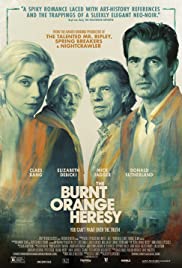
THE BURNT ORANGE HERESY
US, 2019, 95 minutes, Colour.
Claes Bang, Elizabeth Debicki, Mick Jagger, Donald Sutherland.
Directed by Giuseppe Capotondi.
All is not well in the art world. We are drawn into the world of art critics, of the world of painters, of the world of art dealers. It is also a world of forgeries and frauds – and leading to violence.
A character remarks that the title, The Burnt Orange heresy sounds rather pretentious. It is – but it is used with some ironyas a title for a painting which does not exist, then does exist but is a fraud.
The film is something of a cinema portrait of an art critic. His name is James Figueras and is played by the Danish actor with impeccable pronunciation and articulation, Claes Bang. (Interestingly, and coincidentally, Claes Bang appeared immediately afterwards in another film about art and forgery, The Last Vermeer, set in postwar Holland, where he is an investigator into a case where Nazi leader Herman Goering bought a Vermeer from Dutch artist.).
Perhaps we should be suspicious right from the start when James is rehearsing a lecture that he is to give while he exercises, gets dressed for work – and then the intercutting of the actual talk to an audience of mainly older women, explaining a painting, the artist painting in a concentration camp, his fate, that of his sister, the audience rapt, swayed by his persuasion. Also in the audience is a young woman, Berenice (Elizabeth Debicki), very attentive, talking with James and immediately beginning a sexual liaison with him.
She has her own story, masking what really happened to her, gradually revealed.
But, there is more in the art world. The couple are invited to the house of an art dealer, an interesting cameo from Mick Jagger at a vigorous 75. James wants to interview a celebrated artist, write a book, to do catalogue of his art collection.
The famous painter is played by Donald Sutherland, always a welcome screen presence. The artist has a reputation, a long story, confiding in Berenice, tantalising James about the possibilities.
The film takes on quite a melodramatic turn as it progresses, twists in the possibilities for James’s career, and some unexpected violence, shocking in its way.
Audiences need to be attentive to the interplay of the characters, their playing each other, the consequences of fraud and the thwarting of ambitions.
All is not well in the art world.
1. The title? The tone? The false painting? Deliberately pretentious title?
2. The art world, in the United States, in England, in Italy? The locations, the mansion and lake, countryside, the interiors? The contrast with the art world, offices, exhibitions, studios? The musical score?
3. Deception in the art world? Ambitions, frauds, forgeries – and violence and murder?
4. The portrait study of James Figueras? The presence of Claes Bang? The opening, exercise and dressing, rehearsing his speech, intercutting with the performance, the audience, the visuals of the painting, Berenice present and watching? The audience, listening to his telling the story from the concentration camp, the portrait, the evil symbol of flies, the desperate sister? And then the revelation of the truth about his painting it, the gullibility of audiences? His saying beware of critics?
5. Berenice, present, talking with James, the immediate sexual encounter, staying with him, the invitation by Cassidy? The gradual revelation of her story, her mask, from south of Duluth, teacher, confiding in Jerome, her leaving, playing around? Her relationship with James, love, sexuality, interest? Sharing with him? Discussions with Jerome, the bond between them? Her concern about James, the pills, his deals with Cassidy, the camera and photographing the paintings, the discovery of no paintings, her criticisms of James? His anger, trying to drown her, the discussion, his hitting her, disposing of her body in the Lake?
6. Cassidy, the presence of Mick Jagger, his style, dealing, unscrupulous, using James, the party, the later meetings? The exhibition? Whether Cassidy knew what had happened on not? His tantalising James?
7. Jerome, his career, reputation, meeting with James and Berenice? The discussions, on the boat, the walks? His story, his mask, confiding in Berenice? The discussion with James about heritage and legacy? The burning of all his paintings? His feeling of freedom, imagining his paintings, the colour of blue, the swimming pool? The meal, going to studio, the vacant canvases?
8. James, his reaction to the truth, upset, his plans? His returning, taking the signed canvas, the letters? Setting fire to the studio?
9. The aftermath, his writing the book, signing the books, the exhibition, The Burnt Orange Heresy? Cassidy noting the fingermark, Berenice and her touching the painting and challenging James?
10. The letter from Berenice with the dead flies?
11. The irony of Jerome, his painting of Berenice in blue, signing it, at her family’s home?
12. The sudden ending, leaving it to the audience to speculate?
Present, The
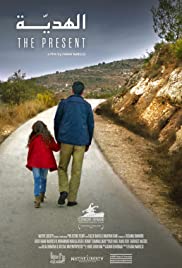
THE PRESENT
Palestine, 2020, 24 minutes, Colour.
Saleh Bakri, Maryam Kanj, Maryam Basha.
Directed by Farah Nabulsi.
A multi-award-winning short film from Palestine, winning at Clermont Ferran and a BAFTA for short film, Oscar-nominated.
The film is highly emotional – especially for the Palestinian audience but also for a sympathetic audience concerned about Israeli treatment of Palestinians. It is a film which can arouse an angry response about injustice and humiliation.
The story is simple, a father wanting to get home and having to go through the border control, his happiness with his wife and daughter, the wedding anniversary, his taking his daughter shopping and their buying a fridge to replace their broken down refrigerator, and has a gift for the anniversary.
There are two key scenes at border control. The film presents the young Israeli soldiers, men and women, as single-minded, hostile to Arabs, eager to humiliate them, stressing regulations, searches, delays, even cage internment. The scene with the father taking his daughter across the border and his being subject to harsh treatment, the little girl having to sit on the ground waiting for her father. Then there are the happy scenes of shopping, the supermarket, buying the tiara, the fridge, tying ribbon around it, the delivery van and its being stopped at the border, the father deciding to borrow the trolley and carry the fridge home because he lives just across the border.
Again trying to get across, the verbal attacks, the humiliations, the father losing his temper. And, the little girl, has wet herself and is upset. And she is still wearing the tiara that her father bought her at the supermarket. The problem is that the fridge is too large to get through the control area for people to get through. There are many arguments, the father pleading that he lives nearby.
Then, as they argue, the little girl pushes the fridge through the more open space and one soldier lets the father through.
(For audiences interested in dramatising such difficulties of border crossing between Israel and Palestine the powerful feature film, Crescendo, also has similar kinds of harsh sequences.)
Ascendant
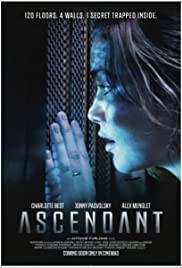
ASCENDANT
Australia, 2021, 12 minutes, Colour.
Charlotte Best, Jonny Pasvolsky, Alex Menglet.
Directed by Antaiine Furlong.
One of the creative aspects of filmmaking in Australia is that young writers, producers, directors, have possibilities for developing their projects with the help of Commonwealth and state funding. Often the films are small-budget, rely on character actor casts rather than stars, are able to exercise technical expertise, especially when they make genre films – and many of them have made small horror films. This is one of those films.
However, one of the difficulties is financing distribution, a reliance on international audiences (and often some international settings and accents with a touch of the American). And, distribution often relies on streaming services. This also happens with this film.
Actually, it is the kind of horror-drama that is popular with audiences of specialised festivals of horror films. The title actually refers to a very tall building in Shanghai, a hotel, over 100 floors, and a series of elevators. One particular elevator is a lot in the ascendant but it also has some crashing down, descendant.
On the whole, the action is confined to the cabin of the elevator, making the early part of the film quite claustrophobic, not just for the young woman who has been abducted, drugged, awakens in the elevator to find herself bound and gagged, but for the audience itself. There is some relief for the audience – not for the young woman, Aria (Charlotte Best). She can escape in her memories and imagination – but they are visualised, however briefly, for some relief for the audience. Aria remembers her twin sister, playing on the beach, their devoted parents, the loving father, and the suggestion of some mysterious powers that the girls have. Just suggestions in the early part.
The action is literally jolting, especially when the lift suddenly descends, Aria hanging suspended and then crashing to the floor (quite a number of times).
There is some explanation as to what happens – and the use of a television screen in the elevator cabin, showing Aria’s father, being tortured, the standover interrogator, Russian, with a couple of thugs, wanting to get information from her father. He refuses. She does not know the answers.
Aria also has the benefit of a mobile phone – although, at one stage, she has to get herself out of the elevator and onto high beams in the shaft to recover her phone.
This kind of mysterious claustrophobic thriller may not appeal to a number of audiences – but for those who find the synopsis and its mysteries rather tantalising, most probably their film.
1. The title? Expectations? The elevator? The high building? The many floors?
2. The unfolding of the plot? The abduction, the imprisonment of Aria? The taking of her father, the torture, motivations, the search for the missing expert? The Russian background?
3. The more exotic aspect of the screenplay, cosmic, superpowers? The twin girls? The visualising of their past, with their father, together, the secrets, the powers? Aria and her growing up? Her bond with her father?
4. The sequences in the elevator, the confined space, claustrophobic, Aria coming to consciousness, trapped? The lift going up and down? The sudden falls, her being suspended, collapsing onto the floor? Her calling out, confusion, anguish? Her trying to get out, the heights, the beams, recovering the mobile phone? The importance of the mobile
phone, communication, battery running low, her uncle Jack and the communications? (And the irony of the revelation that it was a Russian impersonation?)
5. The screen in the elevator, the Russian, her father, the interrogation, the torture, blood? His appeal to his daughter? The device of the threat coming by visuals?
6. Aria, her response, her memories? Her fears? The attempt at escape? The physical consequences?
7. The Russian, brutal, the henchmen, their participating in the torture?
8. The father, his silence, anguish with his daughter? Pleading with her? Is not revealing the truth?
9. The deception, father and daughter speaking, the fact that there was no missing expert? Aria and her powers?
10. Aria, discovering powers, exercising them?
11. Aria, her future, the Russians, her father?
12. An Australian thriller, Shanghai setting, filmed in Australia, the Australian cast? Accents, issues, for an international audience?
